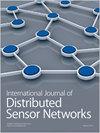An improved algorithm of segmented orthogonal matching pursuit based on wireless sensor networks
IF 2.5
4区 计算机科学
Q3 COMPUTER SCIENCE, INFORMATION SYSTEMS
International Journal of Distributed Sensor Networks
Pub Date : 2022-03-01
DOI:10.1177/15501329221077165
引用次数: 1
Abstract
Aiming at the problems of low data reconstruction accuracy in wireless sensor networks and users unable to receive accurate original signals, improvements are made on the basis of the stagewise orthogonal matching pursuit algorithm, combined with sparseness adaptation and the pre-selection strategy, which proposes a sparsity adaptive pre-selected stagewise orthogonal matching pursuit algorithm. In the framework of the stagewise orthogonal matching pursuit algorithm, the algorithm in this article uses a combination of a fixed-value strategy and a threshold strategy to screen the candidate atom sets in two rounds to improve the accuracy of atom selection, and then according to the sparsity adaptive principle, the sparse approximation and accurate signal reconstruction are realized by the variable step size method. The simulation results show that the algorithm proposed in this article is compared with the orthogonal matching pursuit algorithm, regularized orthogonal matching pursuit algorithm, and stagewise orthogonal matching pursuit algorithm. When the sparsity is 35 < K < 45, regardless of the size of the perception matrix and the length of the signal, M = 128, N = 256 or M = 128, N = 512 are improved, and the reconstruction time is when the sparsity is 10, the fastest time between 25 and 25, that is, less than 4.5 s. It can be seen that the sparsity adaptive pre-selected stagewise orthogonal matching pursuit algorithm has better adaptive characteristics to the sparsity of the signal, which is beneficial for users to receive more accurate original signals.基于无线传感器网络的分段正交匹配追踪改进算法
针对无线传感器网络数据重构精度低、用户无法接收到准确的原始信号等问题,在分阶段正交匹配追踪算法的基础上,结合稀疏自适应和预选策略进行改进,提出了一种稀疏自适应预选分阶段正交匹配追踪算法。在分阶段正交匹配追踪算法的框架下,本文的算法采用固定值策略和阈值策略相结合的方法,分两轮筛选候选原子集,以提高原子选择的准确性,然后根据稀疏性自适应原理,采用变步长方法实现了稀疏近似和精确的信号重构。仿真结果表明,本文提出的算法与正交匹配追踪算法、正则化正交匹配追踪方法和分段正交匹配追踪法进行了比较。稀疏度为35时 < K < 45,与感知矩阵的大小和信号的长度无关,M = 128,N = 256或M = 128,N = 512得到改善,并且重建时间是当稀疏度为10时,在25和25之间的最快时间,即小于4.5 可以看出,稀疏性自适应预选分段正交匹配寻踪算法对信号的稀疏性具有更好的自适应特性,有利于用户接收到更准确的原始信号。
本文章由计算机程序翻译,如有差异,请以英文原文为准。
求助全文
约1分钟内获得全文
求助全文
来源期刊
CiteScore
6.50
自引率
4.30%
发文量
94
审稿时长
3.6 months
期刊介绍:
International Journal of Distributed Sensor Networks (IJDSN) is a JCR ranked, peer-reviewed, open access journal that focuses on applied research and applications of sensor networks. The goal of this journal is to provide a forum for the publication of important research contributions in developing high performance computing solutions to problems arising from the complexities of these sensor network systems. Articles highlight advances in uses of sensor network systems for solving computational tasks in manufacturing, engineering and environmental systems.

 求助内容:
求助内容: 应助结果提醒方式:
应助结果提醒方式:


